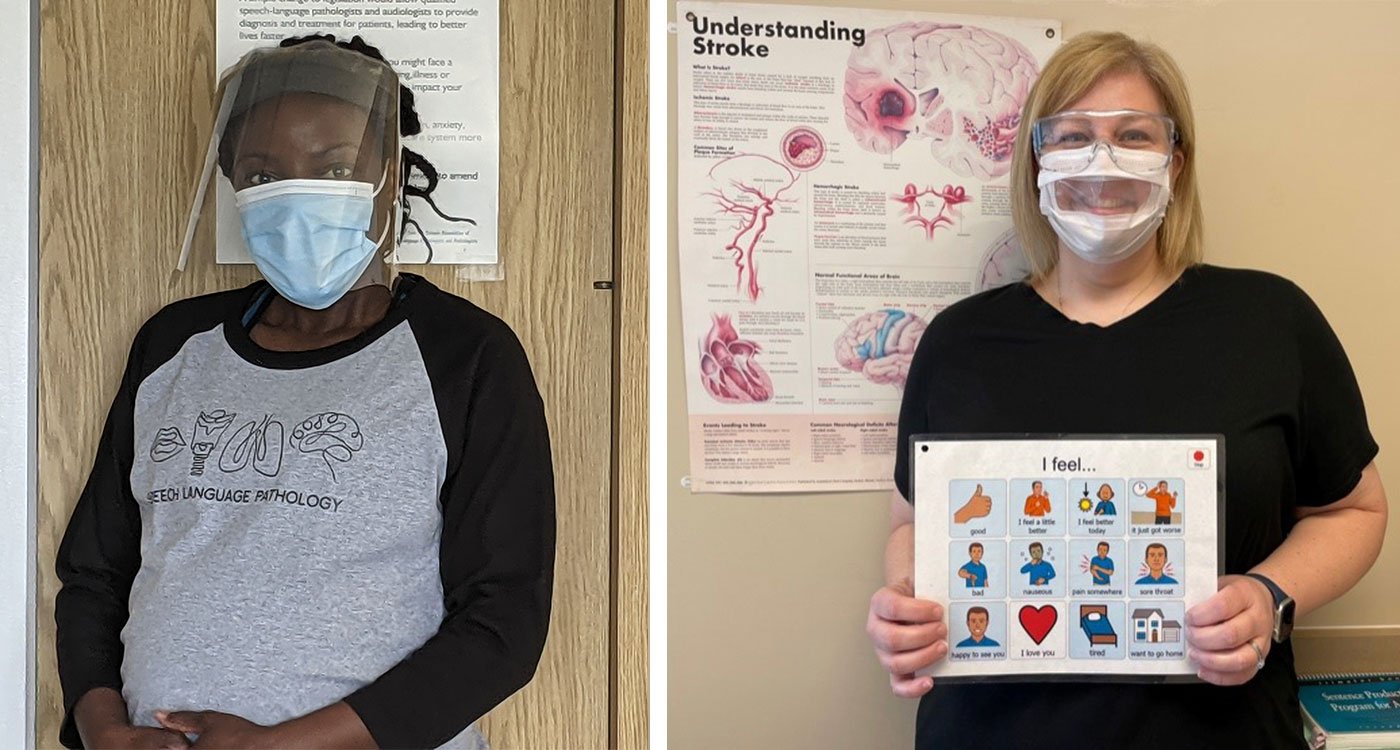
The ability to communicate, whether through reading, writing or speaking, can often be taken for granted. Throughout the COVID-19 pandemic the need to communicate has become more important than ever as those with pre-existing communication disorders are faced with new challenges with mask-wearing. We spoke with Marsha Wilson, Speech Language Pathologist, and Heather Dawson, Communicative Disorder Assistant, to learn more about their collaborative work with individuals with communication disorders.
What do speech language pathologists and communicative disorder assistants do?
MW: Typically in acute care, I’m assessing patients with communication or swallowing difficulties - about 95 per cent of the patients I see have had difficulty swallowing, otherwise known as dysphagia. With these patients, I conduct a bedside swallow assessment and based on the findings, I might suggest another assessment known as a modified barium swallow study. The main goal during these assessments is reduce the risk of aspiration which is when something you swallow incorrectly enters your airways or lungs.
HD: I work in collaboration with the speech language pathologists (SLP). Once the SLPs have completed their assessments on their patients, they create goals and pass them on to me to provide hands-on therapy with the patient. Our sessions can focus on any aspect of communication such as talking, listening, reading and writing. I conduct the therapy sessions, make personalized communication books and homework packages to help their progression. I get to do the fun stuff!
How do speech language pathologists and communicative disorders assistants work together?
HD: Once an SLP has completed their assessment on a patient, they would provide me with a rundown and goals for the patient. We discuss these goals and if I have any questions or concerns, the SLPs are able to answer them. While we work with the patient, we modify goals if need be and we keep in contact. We make sure to keep in contact about how things are going and the patient’s progress.
MW: Currently we don’t have any communicative disorders assistants (CDA) in acute care at Osler. If we did, they would likely work collaboratively with the SLPs, assisting with activities such as information gathering and completing observations as directed by the SLP. There could also be opportunities for the CDAs to complete swallowing exercises and communication therapy based on the treatment plan proposed by the SLP.
How has the pandemic changed your role?
MW: When the pandemic hit, my focus was to try to provide the same level of care that I had been providing prior to the pandemic. I found that I was spending more time with some of the patients as they were feeling isolated related to COVID-19 restrictions. I also found that I was communicating more with family members, since they aren’t able to come visit. I was spending more time providing relevant education, reviewing treatment plans, and liaising with other team members.
HD: Effective communication and masking has been a bit of a challenge. A lot of the patients I work with have aphasia or apraxia of speech and many of them rely on the visual of seeing my mouth move while I speak. It is also difficult for some patients who experience hearing loss who rely on lip reading to supplement. It has been challenging trying to find ways to work around these barriers, but we now have access to windowed masks that allow patients to see mouth movements during our sessions. They’ve been working really well!
What is something people may not know about speech and hearing from the perspective of your role at Osler?
MW: I think that sometimes people forget that we can do much more than swallowing intervention. Our training has provided with the expertise to assess and provide treatment for various speech and communication disorders. Here at Osler, we can provide intervention for patients 18 years and older.
HD: I think in general, a lot of people don’t know what a CDA stands for or what we do, so I am happy to share that here! I also think many people don’t know about the impact that communication disorders can have on your life, unless they’re involved in stroke rehabilitation. Being able to educate patients and families on how to communicate successfully is why I love what I do.

